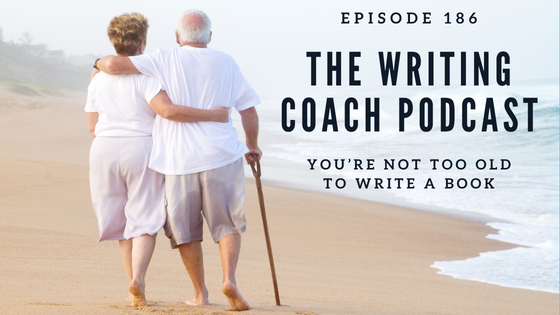People spend their entire lives wanting to write.
They get a taste of it when they are younger, in High School or University, but then life happens.
They get married, and they turn their focus to raising a family.
Or they make an effort to progress through the hierarchy of careers.
Or put their energy into building a business.
Often, it’s only upon finally reaching retirement age that they have the space, time, and energy in their lives to dedicate to their writing . . .
And that’s okay!
In this episode of The Writing Coach podcast, I explain why age isn’t a hindrance to becoming an author and how it is, in fact, an advantage.
Listen now!
The Writing Coach Episode #186 Show Notes
Download the FREE Scene Alchemy Essentials Checklist Now!
The Writing Coach Episode #186 Transcript
Podcast: Play in new window | Download
Subscribe: Apple Podcasts | RSS
Hello, beloved listeners, and welcome back to The Writing Coach podcast. It is your host, as always, writing coach, Kevin T. Johns here.
Did you know that I give away a free book on my website? The book is called Novel Advice: Motivation, Inspiration and Creative Writing Tips for Aspiring Authors. You can get it here.
A topic that comes up surprisingly often with the clients that I work with, as well as with potential clients and people that I have consultation calls with, is the idea of being “too old to write.” You would not believe how often people come to me and say, “Kevin, I think I might just be too old to do this. I might be too old to write a book.” I’ve had people from the ages of 30 to 70 say this to me, and my response to this fear that you’re too old to write is that it’s much more likely that someone is too young to write a book than it is that they’re too old to write it.
Some people tend to think of becoming an author as something like being a professional sports athlete or a model or a pop star or something. Yes, if you are hoping to be a football star in your 40s, I hate to tell you, but it probably ain’t happening. If you’re in your 60s, and you’re still holding on to that dream of becoming the next Britney Spears or Madonna or whatever the latest pop sensation is, it’s probably not going to happen. While there are careers where the chances of hitting it big do decline with age, I don’t think writing is one of them.
In fact, I would argue that long-form fiction writing, in particular, is a skill set that really takes many years to develop and perfect. That’s not just many years of developing and perfecting your writing, but also many years of living life.
I like to say that books entertain, but they also share wisdom. Much of the wisdom that authors share in their books is the type of wisdom that’s gained through life experience, through actually having gone through things. The more triumphs you experience and the more tragedies you endure, the better perspective you’ll have as an author.
Let’s look at someone like Ernest Hemingway. He spent time as an expatriate in France. He spent time as a World War I ambulance driver, and he spent time as a soldier in the Spanish Civil War. Each of these experiences went on to inform books like The Sun Also Rises, which is about expatriates, A Farewell to Arms, which is about an ambulance driver in a warm, and For Whom the Bell Tolls, which is again a book about war. Without having lived through genuine life experiences over many decades, Hemingway never could have written those masterpieces.
I look at someone more recent, like Chuck Palahniuk, the author of Fight Club. Long before he was an author, he was a member of the Cacophony Society, which is, according to Wikipedia, “An American organization described on their website as a randomly gathered network of Free Spirits united in the pursuit of experiences beyond the pale of mainstream society.”
Now when I think of Palahniuk’s writing—whether it’s Fight Club, Survivor, Rant, or Haunted—all of these books are about people living “beyond the pale of mainstream society,” as the Cacophony Society website describes it.
I understand that the Cacophony Society is thought of as pranksters, and his experiences with that group obviously informed Palahniuk’s writing. For example, in Survivor, the characters go into drugstores, and they mix hair dye from different packaging. They’ll move the red hair dye to the blonde hair dye package and the blonde hair dye to the brunette hair dye package just for the anarchistic, prankster spirit of it. That sort of thing happening in Survivor clearly comes from the author’s experiences in real life doing these sorts of mischief behaviours as part of that Cacophony Society.
We can also look at someone like my favourite, Virginia Woolf.
Virginia Woolf battled mental health for a lot of her life, and at one point, she thought the birds were speaking to her in Greek. Then we go and look at her masterpiece Mrs. Dalloway, one of whom the main character, Septimus Smith, is dealing with mental health throughout the book, and in fact, at one moment, here’s the birds speaking to him in Greek. Again, Virginia Woolf’s life experiences going through something suffering with mental health informed the greatest book possibly ever written, Mrs. Dalloway.
The point here is that reaching middle age or becoming a senior citizen is no reason at all to give up on your dream of becoming an author. In fact, it’s actually a reason to pursue those dreams more vigorously.
As Malcom Gladwell points out in his New Yorker article Late Bloomers, which explores late-blooming painters as well as authors, “The Cézannes of the world bloom late not as a result of some defect in character, or distraction, or lack of ambition, but because the kind of creativity that proceeds through trial and error necessarily takes a long time to come to fruition.”
So many people spend their entire lives wanting to be an author, wanting to write. They get a taste of it when they’re young in high school or university, but then life happens. They get married, and they focus on taking care of their children, or they start a career, and they focus on progressing through their career or building a business. It’s only upon the kids growing up and moving out and finally reaching retirement age that they have the space, the time, and the energy in their lives to dedicate to their writing.
And that is okay.
If you do publish later in life, you won’t be alone:
- William S. Burroughs was 39 when his first book, Queer, was published.
- Henry Miller debuted with Tropic of Cancer at the age of 44.
- Charles Bukowski wrote Post Office and became a published novelist at 49 years old.
- Raymond Chandler’s first book, The Big Sleep, came out when he was 51.
- Richard Adam’s debut effort, Watership Down, was published at age 52.
- Frank McCourt was a 66-year-old retiree when he wrote his first novel, Angela’s Ashes.
- Norman McLean launched an author career at the ripe age of 74 with A River Runs Through It.
Age wasn’t a factor for any of these authors, and it shouldn’t be for you, either.
There is even a website, Bloom, dedicated to “authors whose first books were published when they were 40 or older; who bloomed in their own good time”.
When it comes to writing and publishing your first novel, it’s never too late.
I’ve worked for several years as a ghostwriter, and usually, I was ghostwriting books for elderly people people with a lifetime of experience that they wanted to share through a book. One of those people that I wrote for taught me this Chinese proverb that I think is absolutely so wonderful. It’s this:
The best time to plant a tree was 20 years ago. The second-best time is now.
You can’t go back in time and start writing that book you never wrote. You can’t go back in time and start studying writing the way you should have twenty years ago. There is only now. There is only this moment. Don’t worry about your age. When it comes to writing a novel, being older is more of a benefit than it is a hindrance. If you want some help with that writing process with learning the craft, you know where to find me.
All right, that is it for this episode. Thank you so much for tuning in. I will see you on the next episode of The Writing Coach.







